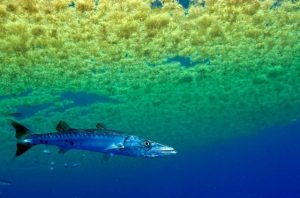December 20, 2011
By David Conway

A new University of Miami study sheds some light on the diver's everpresent friend, the barracuda. For anglers and boaters who regularly travel the coasts of Florida the great barracuda (Sphyraena barracuda) is a common sight. Surprisingly, however, very little is known about the early life stage of this ecologically and socio-economically important coastal fish.
In the journal Marine Biology, lead author Dr. Evan D'Alessandro and University of Miami Rosenstiel School of Marine & Atmospheric Science colleagues Drs. Su Sponaugle, Joel Llopiz and Robert Cowen investigate the larval stage of this ocean predator, as well as several other closely related species.
“Due in large part to the expense and difficulty of collecting fish larvae from the open ocean, the larval ecology of barracuda were a mystery until now,” said D'Alessandro. “A research study led by Dr. Robert Cowen, which sampled the Straits of Florida regularly for two years, provided a unique opportunity to catch a glimpse of the larval life of many fishes.”
The study samples included great barracuda (92.8%) and their relatives Sphyraena borealis and Sphyraena picudilla (6.6%), commonly known as sennets.
In their larval stage, which generally lasts several weeks, barracuda and sennets remain in the upper 25 m of the ocean and live on a similar diet. They start out consuming copepods, or small crustaceans, but make an early switch to a diet of fish larvae, much like several larval billfishes and tunas.
“Barracuda are an important element in the marine food chain; they are voracious predators of other fishes as juveniles and adults on reefs and other nearshore habitats. Now we know this holds true for their larval stage before they reach an inch in length as well,” said D'Alessandro. “This novel study unlocks important aspects of the barracuda's life cycle. It also identifies an important size advantage within the larval stage (bigger larvae are more likely to survive) and provides insight that resource managers can use to better manage this species.”
You can find more cool news in the Diver's Corner on the FS Forum, such as FS member Robert D's Cobia and Lobster report, with video.
